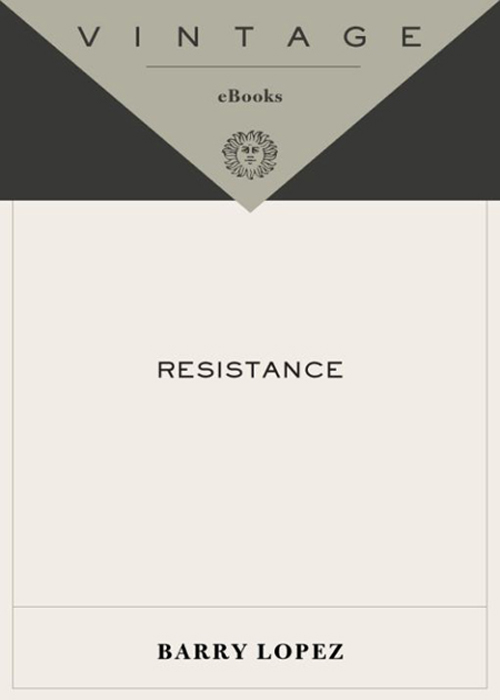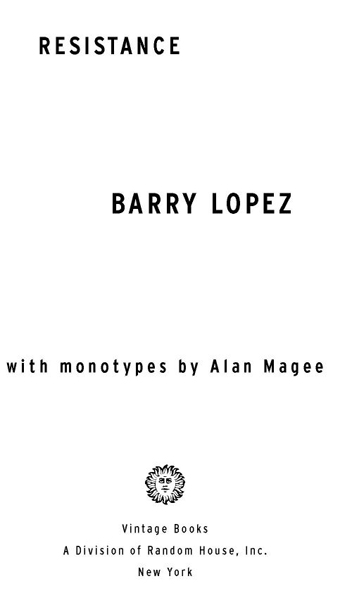Resistance



Table of Contents
For Amanda, Stephanie, Mary, and Mollie
Praise for Barry Lopez’s
RESISTANCE
“Diamond-sharp . . . sumptuously descriptive. . . . Lopez gives us a glimpse of how the sparks fly when individual will digs in against culture’s monolith.”
—
Milwaukee Journal Sentinel
“Powerfully insightful. . . . If you’re looking for a refreshing switch from silliness, you need look no further than Lopez.”
—
Seattle Post-Intelligencer
“September 11 was the day that changed the world forever [and] in his latest collection of short fiction, Barry Lopez addresses the premonitory tremors and staggering aftershocks of that utterly changed world. . . . Eloquent defenses of the natural world, of indigenous peoples, of moderation, of life lived outside the mainstream. . . . Lopez’s writing is luminous, almost shamanic, with metaphors and poetic rhythms pulsing from every page.”
—
LA Weekly
“A cunning work of fiction likely to provoke anyone with hope of the future to reassess their current strategies for happiness. . . . Through these mesmerizing stories, Lopez challenges us all to pay attention to how well our lives express our deepest values.”
—
Rocky Mountain News
“A manifesto for the twenty-first century. . . . Crammed with action, heartbreak, exotic locales and dangerous ideas. . . . Potent medicine for readers— especially American readers—exhausted by contemporary events and close to surrender.”
—
Santa Cruz Sentinel
“Barry Lopez is a writer of alchemical powers who transforms tyranny with a brilliance of language into brave acts of conscience and consequence.”
—
Terry Tempest Williams
“Barry Lopez is a rarity—a writer of unembarrassed seriousness.
Resistance
, his sequence of depositions from nine troubled travelers, is a work of luminous gravity. It sets the oldest wisdoms of myth and landscape against the newest conventions of the West in narratives which are daring, sensuous, beautiful and important.”
—
Jim Crace
“A dynamic and remarkable meditation on engagement. . . . Written against the paranoia that accompanies terrorism and its mirror image, the Patriot Act,
Resistance
is subtle and persuasive protest literature. . . .
Resistance
makes explicit the connection between art and politics, suggesting it’s high time they work together again.”
—
St. Petersburg Times
AUTHOR’S NOTE
The monotypes in
Resistance
are from a larger body of work created by Alan Magee between 1990 and 2000. A few of the earliest images were included in a show of the artist’s work at the Staempfli Gallery in New York in the fall of 1990. The full collection was presented for the first time at the Berliner Philharmonic in Berlin in November 2000.
I would like to thank Alan and Monika Magee for their conversation and hospitality while I was at work on
Resistance,
and also Marion Gilliam for his gracious support. Luis Verano, Isabel Sterling, Skip Cosper, and T. R. Hummer helped me clarify several fine points in the stories, and I’m most grateful.

Apocalypse
I remember the morning the letter came. I left the apartment Mary and I were renting on rue Lepic and strolled in the sunshine up to rue des Abbesses. The old sidewalks were freshly washed, the air was still cool. My regular way was to get a morning paper, a brioche, and black coffee and then sit in the little park by the Métro station and read. Sometimes I would walk up Yvonne-le-Tac to the terraced park below Sacré-Coeur instead, but that morning I had that fistful of mail.
We took the apartment partly because it was right around the corner from the cemetery in Montmartre. Mary was writing an essay about the cemeteries of France for
Harper’s,
a history of how they had been disrupted and desecrated by revolution, by the expansion of cities, and of course by the Church. The Cimetière de Montmartre was palpable, a reassurance to her. Many of its graves had been destroyed in 1789, the bodies treated like so much trash by those who hated royalty and aristocracy, and by the hoodlums who always attach themselves to social change. But Degas is buried there, the composer Berlioz, Nijinsky, and her favorite, Adolphe Sax, the inventor of the saxophone.
It was not these ghosts, though, nor the untroubled
allées
colonnaded by plane trees, that calmed her. It was that the stillness sheltered an aggregation of mute evidence, apparent throughout the city in its small-scale neighborhoods, that our history is finally human. Regimes and ideologies— Tamerlane’s Mongol empire, Caligula’s Rome, Stalin’s Soviet Union—whatever their horrors, whatever afflictions they deliver, pass away. What endures is simple devotion to the question of having been alive. The cemetery comforted her because it was not about death but about transcendent joie de vivre.
One day she returned to the apartment and read me an inscription she’d copied from a gravestone.
Ma gracieuse épouse . . .
A husband had expressed his love and regard for his wife of fifty-one years in a few bare, unselfconscious sentences. Mary sat with the piece of paper in her hand by the open window, watching patrons in the bistro across the street talking and hailing friends passing on the sidewalk, and turned a shoulder so I could not see her crying.
Her tears, I thought, were over a kind of loss we had talked about in recent weeks, the way the fabric of love scorches, no matter how vigilant we are. The intricate nature of the emotions men and women exchange made the two of us sense our own endangerment when we disagreed; but we had also been speaking of the ephemeral love one can feel toward a complete stranger, for the way they step off a sidewalk or a father hands his daughter her gloves at the door. Bound together in these many ways we are still swept suddenly out of each other’s lives, by tides we don’t recognize and tides we do. The sensation of loss, the weight of grief, the feeling of being naked to a menace are hard to separate. The fear of an outside force at work makes us reticent in love, and suspicious. We identify enemies.
The instruments of discord show up daily in our lives, of course, demanding our attention. The unscrupulous peer, the woman on the make, the purblind enforcer, the self-anointed official and his cronies, people with a craving for confrontation. We are foolish to give any of them what they ask for, and we betray ourselves and anyone toward whom we have ever felt tender by not sending such people immediately on their way.
The first two pieces of mail I opened that morning were letters from museums, one in Rouen, the other in Orléans. At the time, I was trying to assemble work by European artists which had been shaped by their experience with
le Maquis,
the French underground, for a show to open at the Walker Art Center in Minneapolis and then to travel around the United States. The communications were about insuring the works the museums were lending. I read each one with relief as, sentence by sentence, they eliminated the risks on my part. I should have known—the consideration.
The rest of the mail was personal—friends and family, some items of business for Mary. The one letter I put off reading sat all the while on the green slats of the bench while I finished perusing the paper. The envelope had the look of something you might be sent by the Internal Revenue Service, carrying news of an irregularity in your filings, a notice of additional tax due, perhaps a penalty. But the letter was from another federal authority, a branch of our government but a few years old though already monolithic. Its special charge was to make the nation safe from attack by a great array of vaguely defined “terrorists,” domestic and foreign. This work it pursued with religious fervor and special exemptions from the Department of Justice.
I read the letter twice, concealed it in the half fold of
Le Monde,
and walked back to the apartment. Mary was in her robe, making breakfast. I handed her the letter and took her place at the stove.
She read it in the chair by the window.
“I will never get used to this hyperbolic crap,” she said, folding the letter back up. “Every fascist step they take, you expect people to laugh in their faces, just take their toys away, you know—the guns and the new laws. Do they just not register the suspicion, the resentment in half the streets in the world?”
She turned abruptly to look out the window, as if responding to someone down there on the sidewalk. Incomprehension, exhaustion, fear passed behind her eyes. She let the letter drop to the floor as if it were an advertising circular.
“I can’t believe we have to take people like this seriously, Owen.”
I put breakfast on the table, refreshed her coffee, and came back with my laptop. I began e-mailing a loose network of people I’d been in regular touch with since the change of administration took place in our country. We communicated through a series of codes and used electronic back doors which delayed exchanges, but by mid-morning I’d confirmed what I had suspected. The letter had gone to everyone.
It came from Inland Security, the group of people we had come to call the Idiots of Light, for the way they are dazzled by their god. Their ranks include people who celebrate the insults of advertising and the deceptions of public relations campaigns as paths to redemption. The letter also originated with the Division of Economic Equality, those in the Department of Commerce we call the Lottery Enforcers, who argue for the calming and salutary effect of regular habits of purchase. And it bore the gold, eagle-talon insignia of the Delta Confederacy, the contingent of citizen groups that reports to the education staff of the Office of Inland Security.
The letter’s authors informed us of the nation’s persisting need for democratic reform. Each of us was told of widespread irritation with our work, and the government’s desire to speak with us.
The authority behind the letter—two crisply printed cream-colored sheets of laid paper with signatures in red ballpoint—made my breath shudder. I sat watching for incoming e-mail. We hadn’t anticipated this, not exactly this frontal an approach.
After university I and my friends had scattered abroad—to Brussels, Caracas, Sapporo, Melbourne, Jakarta, any promising corner. Two or three went deep upriver on the Orinoco or out onto the plateaus of Tibet and Ethiopia. We had come to regard the work of writers and artists in our country as too compliant, as failing to expose or indict the escalating nerve of corporate institutions, the increasing connivance of government with business, or the cowardice of those reporting the news. In the 1970s and ’80s, we thought of our artists and writers as people gardening their reputations, while the families of our neighborhoods disintegrated into depression and anger, the schools flew apart, and species winked out. It was the triumph of adolescence, in a nation that wanted no part of its elders’ remonstrance or any conversion to their doubt.
The years passed. We had no plan. We had no hope. We had no religion. We had faith. It was our belief that within the histories of other, older cultures we would find cause not to be incapacitated by the ludicracy of our own. It was our intuition that even in those cultures into which our own had injected its peculiar folklore—that success is financial achievement, that the future is better, that life is an entertainment—we would encounter enduring stories to trade in. We thought we might be able to discern a path in stories and performances rooted in disparaged pasts that would spring our culture out of its adolescence.
This remains to be seen. We stay in close touch (a modern convenience), scattered though we are. And now others, of course, keep close watch on us, on what we write and say, on whom we see. We are routinely denounced by various puppet guards at home, working diligently for a prison system we don’t believe in. As the days have mounted, though, we’ve tasted more of the metal in that system’s bars.
We feel cold.
Our goal is simple: we want our country to flourish. Our dilemma is simple: we cannot tell our people a story that sticks. It is not that no one believes what we say, that no one knows, that none of our countrymen cares. It is not that their outspoken objections have been silenced by the rise at home of local cadres of enforcement and shadow operatives. It is not that they do not understand. It is that they cannot act. And the response to tyranny of every sort, if it is to work, must always be this: dismantle it. Take it apart. Scatter its defenders and its proponents, like a flock of starlings fed to a hurricane.
Our strategy is this: we believe if we can say what many already know in such a way as to incite courage, if the image or the word or the act breaches the indifference by which people survive, day to day, enough will protest that by their physical voices alone they will stir the hurricane.
We’re not optimistic. We chip away like coolies at the omnipotent and righteous façade, but appear to ourselves as well as others to be ineffective dissenters. We’ve found nothing to use against tyranny that has not been written down or danced out or sung up ten thousand times. It is the somnolence, the great deafness, that reveals our problems. It is illiteracy. It is an appetite for distraction, which has become a cornerstone of life in our nation. In distraction one encounters the deaf. In utter distraction one discovers the refuge of illiteracy.
And here is nearly the bitterest of blunt issues for us: What can love offer that cannot be rejected? What gesture cannot be maligned as witless by those who strive for every form of isolation? When we were young, each of us believed that to love was to die. Then we believed that to love was essential. Now we believe that without love our homeland— perhaps all countries—will perish. Over the years, as we have learned what it might mean to love, we have generally agreed that we’ve better understood the risks. In our nation, it is acceptable to resent love as an interference with personal liberty, as a ruse the emotions employ before the battlements of reason. It is the abused in our country who now most weirdly profess love. For the ordinary person, love is increasingly elusive, imagined as a strategy.
We reject the assertion, promoted today by success-mongering bull terriers in business, in government, in religion, that humans are goal-seeking animals. We believe they are creatures in search of proportion in life, a pattern of grace. It is balance and beauty we believe people want, not triumph. The stories the earth’s peoples adhere to with greatest faith—the dances that topple fearful walls; the ethereal performances of light, color, and music; the enduring musics themselves—are all well patterned. And these templates for the maintenance of vision, repeated continuously in wildly different idioms, from the eras of Lascaux and Shanidar to the days of the Prado and Butoh, these patterns from the artesian wells of artistic impulse, do not require updating. They require only repetition. Repetition, because just as murder and infidelity are within us, so, too, is forgetfulness. We forget what we want to mean. To achieve progress, we’ve all but cut our heads off.
We found the Inland Security letter ridiculous, but also alarming. It declared that, as none of us had renounced his or her citizenship, we would be interrogated as nationals “with the full cooperation of the stewards of democracy in your host countries.” We might then be indicted; or dismissed and ignored; or possibly turned over to local authorities, “some of whom,” we were advised, “might have no regard for due process, the writ of habeas corpus, or other advancements in law which are found in civilized countries.” The disposition of our cases, it was made clear, would not be at our discretion.
Our stratagems, the letter continued, were those typical of “terrorist cells.” They called for scrutiny; and we had to desist. We were reminded, then, not any longer to circulate those texts, images, music, and films already listed as anti-democratic in monthly bulletins from the Select Committee on the Arts, an innovation of the Offices of the President. Or any artistic or literary works created by cultures “inimical to our nation’s policies.” To achieve wealth, the letter informed us, is the desire of all peoples everywhere; and while our nation was working to establish wealth for all peoples everywhere, resistance like ours, a quibbling over methods, actually created poverty.